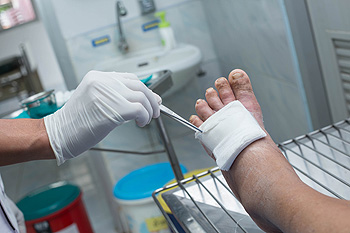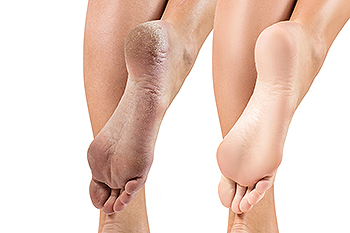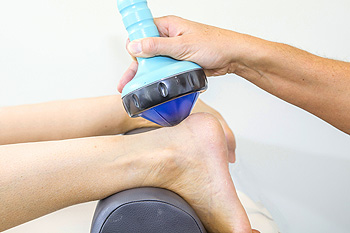Blog
Diabetic Foot Ulcers

If one’s diabetes is not carefully managed through diet, exercise, and insulin treatment, an all-too-common complication can be a foot ulcer. Ulcers develop because skin tissue breaks down and layers of skin underneath are exposed due to poor circulation, high blood sugar, nerve damage, and irritated or hurt feet. Foot ulcers usually develop under big toes or the balls of the feet. Symptoms to watch for are unusual swelling, irritation, redness, discoloration, drainage from the foot, and odors emanating from the feet. The most visible sign of a foot ulcer is when black tissue (known as “eschar”) surrounds the ulcer because of poor blood flow to the area. However, signs of a foot ulcer are not always present or obvious. Good foot care, including wearing properly fitting, quality shoes, maintaining good foot hygiene, proper trimming of toenails, as well as attention paid to other aspects of physical health, such as heart and kidney disease and obesity, can help with the prevention of foot ulcers. Treatment depends on the cause and severity of the ulcer. It is highly suggested to consult with a podiatrist for proper diagnosis and to obtain a treatment plan.
Wound care is an important part in dealing with diabetes. If you have diabetes and a foot wound or would like more information about wound care for diabetics, consult with one of our podiatrists from Pennsylvania. Our doctors will assess your condition and provide you with quality foot and ankle treatment.
What Is Wound Care?
Wound care is the practice of taking proper care of a wound. This can range from the smallest to the largest of wounds. While everyone can benefit from proper wound care, it is much more important for diabetics. Diabetics often suffer from poor blood circulation which causes wounds to heal much slower than they would in a non-diabetic.
What Is the Importance of Wound Care?
While it may not seem apparent with small ulcers on the foot, for diabetics, any size ulcer can become infected. Diabetics often also suffer from neuropathy, or nerve loss. This means they might not even feel when they have an ulcer on their foot. If the wound becomes severely infected, amputation may be necessary. Therefore, it is of the upmost importance to properly care for any and all foot wounds.
How to Care for Wounds
The best way to care for foot wounds is to prevent them. For diabetics, this means daily inspections of the feet for any signs of abnormalities or ulcers. It is also recommended to see a podiatrist several times a year for a foot inspection. If you do have an ulcer, run the wound under water to clear dirt from the wound; then apply antibiotic ointment to the wound and cover with a bandage. Bandages should be changed daily and keeping pressure off the wound is smart. It is advised to see a podiatrist, who can keep an eye on it.
If you have any questions, please feel free to contact one of our offices located in Plymouth Meeting and Ambler, PA . We offer the newest diagnostic and treatment technologies for all your foot care needs.
Unsightly Cracked Heels

Medical conditions that can include psoriasis and eczema may lead to unsightly cracked heels. It is an ailment that is caused by dry skin, and it can happen for a variety of reasons. The skin on the heels can become dry and cracked from wearing shoes that do not have a back, standing on hard surfaces for the majority of the day, or from living in a dry climate. It may be beneficial to drink plenty of fresh water daily, in addition to applying a good moisturizer on the feet before bed. In severe cases, cracks can cause pain and discomfort. Many patients find it helpful to wear shoes that are closed to protect the skin on the heels. If you suffer from this condition, it is suggested that you schedule an appointment with a podiatrist who can effectively treat this condition.
Cracked heels are unsightly and can cause further damage to your shoes and feet. If you have any concerns, contact one of our podiatrists from Pennsylvania. Our doctors can provide the care you need to keep you pain-free and on your feet.
Cracked Heels
Cracked heels appear unappealing and can make it harder for you walk around in sandals. Aside from looking unpleasant, cracked heels can also tear stockings, socks, and wear out your shoes. There are several methods to help restore a cracked heel and prevent further damage.
How Do You Get Them?
Dry skin is the number one culprit in creating cracked heels. Many athletes, walkers, joggers, and even swimmers suffer from cracked heels. Age and skin oil production play a role to getting cracked heels as well.
Promote Healing
Over the counter medicines can help, especially for those that need instant relief or who suffer from chronic dry feet.
Wear Socks – Wearing socks with medicated creams helps lock in moisture.
Moisturizers – Applying both day and night will help alleviate dryness which causes cracking.
Pumice Stones – These exfoliate and remove dead skin, which allows for smoother moisturizer application and better absorption into the skin.
Change in Diet
Eating healthy with a well-balanced diet will give the skin a fresh and radiant look. Your body responds to the kinds of food you ingest. Omega-3 fatty acids and zinc supplements can also revitalize skin tissue.
Most importantly, seek professional help if unsure how to proceed in treating cracked heels. A podiatrist will help you with any questions or information needed.
If you have any questions, please feel free to contact one of our offices located in Plymouth Meeting and Ambler, PA . We offer the newest diagnostic and treatment technologies for all your foot care needs.
Two Types of Shockwave Therapy
 Patients who experience chronic foot pain may benefit from a treatment known as shockwave therapy. Research has shown it may be a helpful remedy for people who have plantar fasciitis. There are two types of this form of therapy, referred to as high and low-energy shock wave treatments. The latter is not painful to administer and may be given in a series of sessions. High-energy treatments are given in one visit and may cause pain. It can be helpful to have a regional block or general anesthesia given before this is used. The purpose of using shockwave treatments is to cause a healing response. This may help deliver nutrients to the affected area, in addition to causing blood vessel formation. Please consult with a podiatrist if you are interested in learning about shockwave therapy, and if it is an appropriate treatment option for you.
Patients who experience chronic foot pain may benefit from a treatment known as shockwave therapy. Research has shown it may be a helpful remedy for people who have plantar fasciitis. There are two types of this form of therapy, referred to as high and low-energy shock wave treatments. The latter is not painful to administer and may be given in a series of sessions. High-energy treatments are given in one visit and may cause pain. It can be helpful to have a regional block or general anesthesia given before this is used. The purpose of using shockwave treatments is to cause a healing response. This may help deliver nutrients to the affected area, in addition to causing blood vessel formation. Please consult with a podiatrist if you are interested in learning about shockwave therapy, and if it is an appropriate treatment option for you.
Shockwave therapy is a treatment commonly used to treat various injuries and conditions, particularly plantar fasciitis in the feet. To learn more, consult with one of our podiatrists from Pennsylvania. Our doctors can provide the care you need to keep you pain-free and on your feet.
Shockwave Therapy
Shockwave therapy is a new treatment option designed to treat bone conditions such as tennis elbow, shoulder pain, and others. Shockwave therapy uses high intensity sound waves that are directed to the affected tissues of the body with pinpoint accuracy. The effects are very beneficial, leading to a production of collagen fibers, eliminating inflammation.
Who Benefits from Shockwave?
Shockwave is recommended for patients suffering from heel pain and associated problems. Heel pain is a common condition which can be caused by obesity, overexertion, and spending a substantial amount of time on hard floors with your feet exposed and unsupported.
Fast and Easy
The therapy is actually a simple process that can leave patients feeling better the very next day. Shockwave therapy is not as dramatic as it sounds. It enables more blood flow to effected areas, addressing the source of the problem and allowing treatment to last for a long time.
Treatment & Recovery Time
Shockwave treatment will enable your feet to recover quickly. This is especially important since surgery is not required. It is cost effective and does not require the use of anesthesia. This treatment is a better option to surgery, since it is proven safe.
If you have any questions, please feel free to contact one of our offices located in Plymouth Meeting and Ambler, PA . We offer the newest diagnostic and treatment technologies for all your foot and ankle needs.

